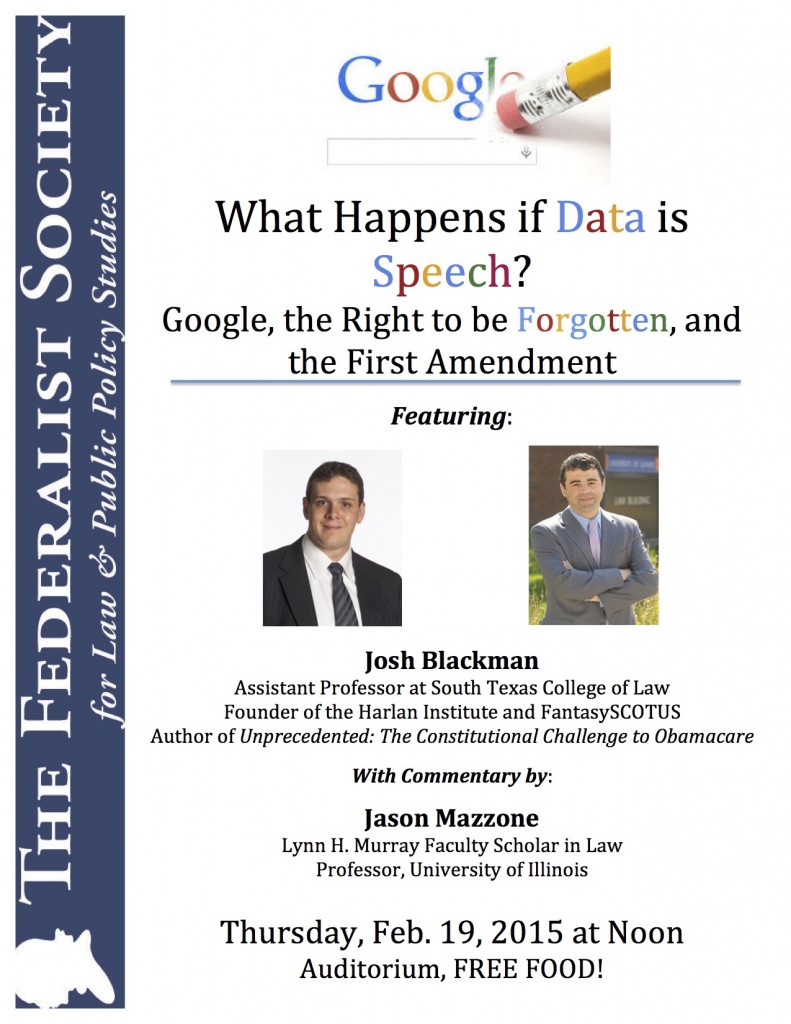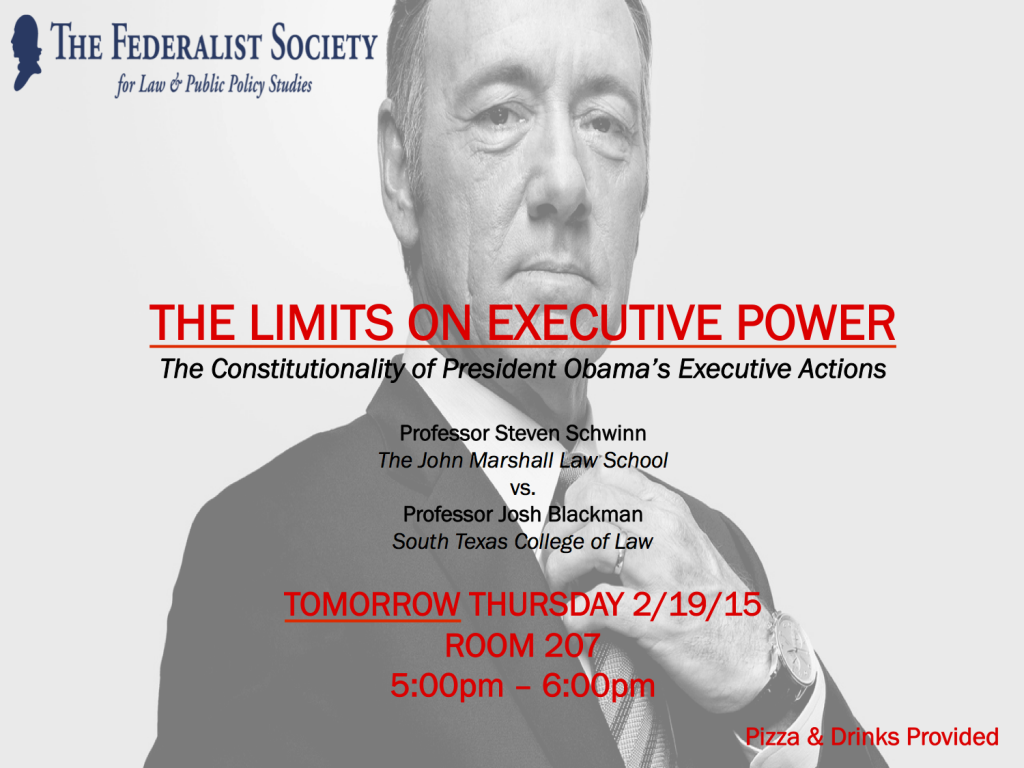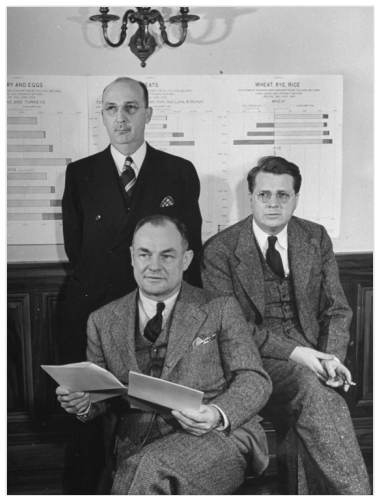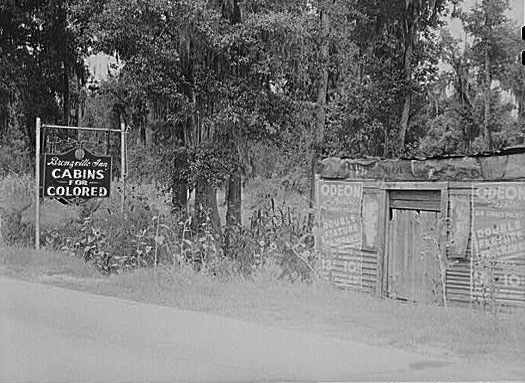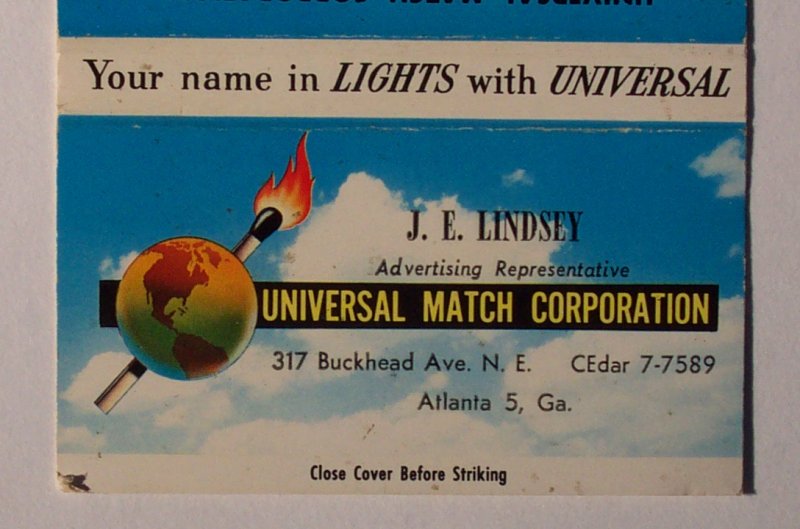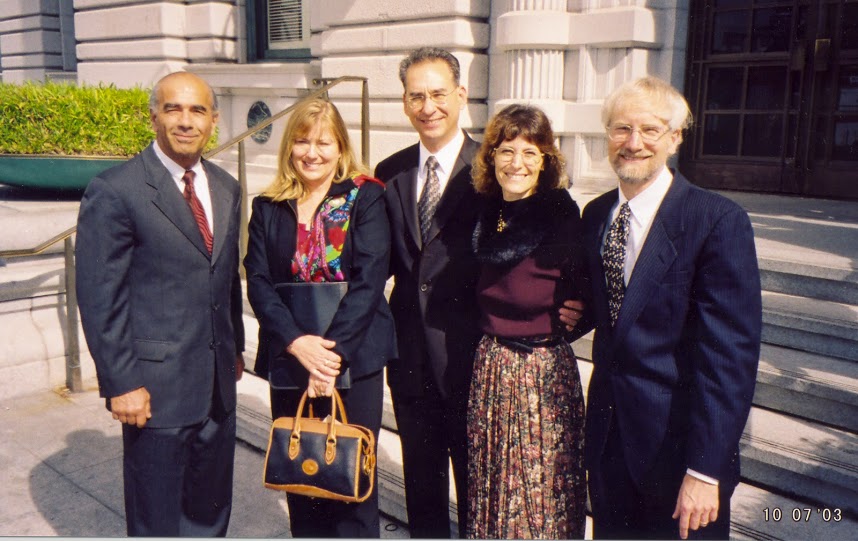Since discussions of the authority of district courts are all the rage, I post again what I wrote in December about whether Judge Hanen could issue a nationwide injunction (he did so).
In a previous post, I noted that Texas sought a “nationwide” injunction against the enforcement of DAPA. Joshua Block of the ACLU kindly noted that the government often argues that “comity between circuits prevents nationwide injunctions.” Joshua pointed me to the 2010 government’s emergency motion for stay pending appeal to the 9th Circuit in the Don’t Ask, Don’t tell case (If you can remember that far, that was back when the Obama administration was defending the law). In this case, the district court issued a nationwide injunction, and the government objected. So could the district court in Texas issue a nationwide injunction? This history of the DADT litigation is very instructive to understand what may come next.
The District Court’s found that DADT was unconstitutional, and issued a nationwide injunction against all DOD officials:
(2) PERMANENTLY ENJOINS Defendants United States of America and the Secretary of Defense, their agents, servants, officers, employees, and attorneys, and all persons acting in participation or concert with them or under their direction or command, from enforcing or applying the “Don’t Ask, Don’t Tell” Act and implementing regulations, against any person under their jurisdiction or command;
In its orders (p. 121 of PDF) the district court acknowledged that its order prevents the government from defending the constitutionality of DADT in other district courts.
To the extent that Defendants’ reference to “other courts” is intended to refer to other district courts, Defendants are correct that this injunction will prevent them from defending the constitutionality of the Don’t Ask, Don’t Tell Act. As discussed above, the proper remedy for the relief sought here is complete invalidation of the Don’t Ask, Don’t Tell Act. As such, Defendants are bound by this Court’s ruling. Further, if Defendants’ objection is that they will be unable to defend current or future as- applied challenges, Defendants once again fail to recognize the nature of Plaintiff’s challenge. Plaintiff did not prevail on an as-applied challenge, which would have rendered the Act unconstitutional as applied to it but not affected the constitutionality of the Act overall. Rather, Plaintiff challenged the constitutionality of the Act on its face and requested an order permanently enjoining the Act’s enforcement. As the Court deems this remedy proper, Defendants are unable to defend the Act in as- applied challenges. Likewise, if Defendants’ objection is that they will be unable to defend current or future facial challenges to the Act, the same reasoning applies. To the extent that Defendants’ reference to “other courts” indicates higher courts, Defendants’ recourse, if they wish to defend the Act further, is to appeal this Court’s ruling.
Second, the district court observed that there was no precedent justifying the government’s arguments that a single district court cannot issue a nationwide injunction:
Defendants next argue that the Court should not issue a nationwide injunction because other circuit courts have found the Act constitutional. Defendants cite no case in which a court finding a federal statute unconstitutional on its face has limited its ruling to a particular judicial district.
Third, the district court turns to the government’s interest in preserving “comity” among the courts of appeals:
The Court next turns to Defendants’ argument that comity prevents the Court from issuing a nationwide injunction. As noted above, of the four circuit cases holding the Don’t Ask, Don’t Tell Act constitutional, Cook is the only case decided after Lawrence and accordingly the only one relevant here. … The doctrine of comity is not a rule of law, but rather is grounded in equitable considerations of respect, goodwill, cooperation, and harmony among courts ….
In AMC Entertainment, the United States brought suit against a national movie theater owner alleging that some of its theaters violated Americans with Disabilities Act (“ADA”) regulations. 232 F. Supp. 2d 1092 (C.D. Cal. 2002) (hereinafter “AMC Entm’t (C.D. Cal.)”). The district court granted the government’s motion for summary judgment and issued a nationwide injunction requiring the defendants to comply with the ADA regulations, and the defendants appealed. Id.
The Ninth Circuit began its analysis by recognizing that district courts have the power to issue nationwide injunctions. AMC Entm’t (9th Cir.), 549 F.3d at 770-71 (“Once a court has obtained personal jurisdiction over a defendant, the court has the power to enforce the terms of the injunction outside the territorial jurisdiction of the court, including issuing a nationwide injunction.” (citing Steele v. Bulova Watch Co., 344 U.S. 280, 289 (1952) (“the District Court in exercising its equity powers may command persons properly before it to cease or perform acts outside its territorial jurisdiction“); United States v. Oregon, 657 F.2d 1009, 1016 n.17 (9th Cir. 1981) (“When a district court has jurisdiction over all parties involved, it may enjoin the commission of acts outside of its district.”))).
Nevertheless, the divided Ninth Circuit panel went on to hold that the district court abused its discretion by issuing a nationwide injunction because “the principles of comity” should have constrained the court from enjoining defendants’ theaters in the Fifth Circuit, which previously had held defendants’ theaters did not violate the ADA. AMC Entm’t (9th Cir.), 549 F.3d at 772-73 (observing that the Fifth Circuit “judicially repudiated” the reasoning adopted by the district court “when considering the same arguments” enforced in the district court’s injunction). The panel held:
Principles of comity require that, once a sister circuit has spoken to an issue, that pronouncement is the law of that geographical area. Courts in the Ninth Circuit should not grant relief that would cause substantial interference with the established judicial pronouncements of such sister circuits. To hold otherwise would create tension between circuits and would encourage forum shopping.
Id. at 773.
AMC Entertainment is distinguishable from the present case because the former turns on statutory construction, not on fundamental constitutional rights. As Plaintiff argues, “Whatever may be the merits [of comity] in the context of statutory construction — where, for example, our legal system tolerates differing rules in different circuits for issues of the law of bankruptcy, securities, antitrust, tax, and the like — it can hold no sway on issues of constitutional rights.” (Resp. at 7.) The Court agrees that the fundamental constitutional rights at issue here must trump considerations of comity. To hold otherwise would create an untenable result in which Defendants could, pursuant to the Act, discharge servicemembers in Maine, Massachusetts, and New Hampshire, but not elsewhere. The doctrine of comity is rooted in equity; here, the balance of equities decisively tips in favor of upholding the fundamental constitutional rights protected by the First and Fifth Amendments to the United States Constitution.
The government filed an emergency motion for a stay to the 9th Circuit, arguing that it would be disruptive to stay the policy, and opposed the nationwide nature of the injunction (and really worldwide, as DOD personnel are stationed around the globe):
Finally, even though this case is not a class action, the district court erred in awarding what is in essence classwide relief – enjoining application of the statute to any member of the military anywhere in the world – in this case brought by a single organizational plaintiff purporting to advance the interests of two individuals. Injunctive relief is an extraordinary remedy and “should be no more burdensome to the defendant than necessary to provide complete relief to the plaintiffs.” Califano v. Yamasaki, 442 U.S. 682, 702 (1979); see also Monsanto Co. v. Geertson Seed Farms, 130 S. Ct. 2743, 2760 (2010) (narrowing injunction in part because the plaintiffs “do not represent a class, so they could not seek to enjoin such an order on the ground that it might cause harm to other parties”); Doran v. Salem Inn, Inc., 422 U.S. 922, 931 (1975) (noting that “neither declaratory nor injunctive relief can directly interfere with enforcement of contested statutes or ordinances except with respect to the particular federal plaintiffs”); Zepeda v. INS, 753 F.2d 719, 727 (9th Cir. 1983) (“A federal court . . . may not attempt to determine the rights of parties not before the court.”); Nat’l Ctr. for Immigration Rights v. INS, 743 F.2d 1365, 1371-72 (9th Cir. 1984). The Supreme Court acted in accordance with this principle by staying an indistinguishable militarywide injunction entered by a district court in a facial constitutional challenge to the prior, more restrictive military regulations regarding gays and lesbians. See Dep’t of Defense v. Meinhold, 510 U.S. 939 (1993) (issuing a stay pending appeal of the portion of an injunction that “grant[ed] relief to persons other than [the named plaintiff]”). This Court subsequently reversed the district court’s decision to enter a militarywide injunction because the plaintiff was challenging his own specific discharge, see Meinhold v. Dep’t of Defense, 34 F.3d 1469, 1480 (9th Cir. 1994), and there is no reason for a different result here.
The DADT precedent does not seem directly on point in the immigration context. The district court in Texas would not be “awarding what is in essence class-wide relief” in a “case brought by a single organizational plaintiff purporting to advance the interests of two individuals.” Rather, it would be stopping the implementation of a policy that violates the separation of powers, and will impact the 17 states in the suit, and like all 50.
The brief also addresses the comity issue:
The district court’s worldwide injunction also inappropriately interferes with the development of the law in other circuits. The Supreme Court has made clear that “the Government is not in a position identical to that of a private litigant, both because of the geographical breadth of government litigation and also, most importantly, the nature of the issues the Government litigates.” United States v. Mendoza, 464 U.S. 154, 159 (1984). This Court has held, moreover, that “[p]rinciples of comity” prevent a district court from issuing an injunction that “would cause substantial conflict with the established judicial pronouncements” of a sister circuit. United States v. AMC Entm’t, Inc., 549 F.3d 760, 773 (9th Cir. 2008).3 If the district court’s injunction is not stayed, it effectively would overrule the decisions of other circuits that have upheld § 654, and preclude consideration of similar issues by other courts. See Va. Society for Human Life, Inc. v. Fed. Election Comm’n, 263 F.3d 379, 394 (4th Cir. 2001) (relying on Mendoza to limit an injunction in a facial constitutional challenge to a Federal Election Commission regulation).
As a counter to this argument, 17 states united in one single suit. To my knowledge, there are no plans for any other states to bring this type of suit. There will not be any other circuit cases on this. Comity seems like a nonstarter. (Sherriff Joe Arpaio brought a suit in D.D.C. against DAPA, but he does not possess the “special solicitude” of the states). In fact, all of the states bringing a suit in a single district creates the best-case scenario for promoting comity. There will be no circuit splits.
Further one obvious difference–in DADT the ex ante status quo is being disrupted by an injunction; with immigration the ex ante status quo is being maintained with an injunction. Once the policy goes into effect, it will be impossible to roll it back (as the President helpfully reminded us). There can be no claim of disruption–short of messing up planning of DAPA–if it is enjoined before anyone signs up. Now, to the extent that people are approved for it, and receive working papers, the equities shift.
Finally, the government argued that the relief would only be limited to the plaintiffs in this case.
The district court recognized that its injunction would prevent the government “from defending the constitutionality of the” statute, Inj. Order 9 (Attachment D), but contended that these principles were inapplicable because Log Cabin challenged the statute on its face rather than as applied, id. at 4, 9. The district court cited no authority for the proposition that the plaintiff’s legal theory changes the permissible scope of the relief and that proposition is not correct. See, e.g., Va. Society, 263 F.3d at 394 (narrowing nationwide injunction to the plaintiff in facial constitutional challenge); Zepeda, 753 F.2d at 727 (same); Nat’l Ctr. for Immigration Rights, 743 F.2d at 1371-72 (same). A criminal defendant, for example, who successfully claims that the statute he is being prosecuted under is facially unconstitutional gets his conviction reversed – not an order preventing the government from prosecuting anyone under the statute. Contrary to the district court’s apparent view, Inj. Order at 4-5, this is not a case in which granting relief to nonparties is necessary to afford the plaintiff complete relief. See Bresgal v. Brock, 843 F.2d 1163, 1171 (9th Cir. 1987) (upholding an injunction extending relief to nonparties because the injunction could not be tailored to apply only to the parties). Here – assuming (contrary to our submission) that some form of injunction was permissible – the injunction should have been limited to any individuals that Log Cabin properly represented.
The 9th Circuit granted a stay (O’Scannlain, Trott, W. Fletcher). Here is a summary of the government’s argument:
On October 12, 2010, the district court entered a permanent injunction enjoining the enforcement or application of an Act of Congress known as the “Don’t Ask, Don’t Tell Act,” codified at 10 U.S.C. § 654. Although the government, including the President, the Secretary of Defense, and the Chairman of the Joint Chiefs of Staff, tells us that “[t]he Administration does not support § 654 as a matter of policy and strongly believes Congress should repeal it,” the government nevertheless asks us to “stay enforcement of the district court’s order pending resolution on the merits by our Court of the constitutional issues involved.” The government argues that the district court’s plenary order–mandating that its injunction be given immediate worldwide effect–will seriously disrupt ongoing and determined efforts by the Administration to devise an orderly change of policy. The government asserts that successfully achieving this goal will require as a preliminary matter the preparation of orderly policies and regulations to make the transition. We are advised by the government that, in legal terms, a precipitous implementation of the district court’s ruling will result in “immediate harm” and “irreparable injury” to the military. To make this point, the government avers that a successful and orderly change in policy of this sort will not only require new policies, but proper training and the guidance of those affected by the change. The government persuasively adds that “[t]he district court’s injunction does not permit sufficient time for such appropriate training to occur, especially for commanders and servicemen serving in active combat.” We also note that the government takes issue with the district court’s constitutional conclusions.
The court stressed that granting a stay is warranted because “Acts of Congress are presumptively constitutional, creating an equity in favor of the government when balancing the hardships in a request for a stay pending appeal.” That presumption is inapplicable here as there was no act of Congress. What is being challenged is an executive policy.
Further, the 9th Circuit stressed that there was a Circuit Split with the 1st, 2nd, 4th, and 8th Circuits, which had upheld DADT. This counseled in favor of granting a stay.
As we said in United States v. AMC Entertainment, Inc., 549 F.3d 760 (9th Cir. 2008),
Principles of comity require that, once a sister circuit has spoken to an issue, that pronouncement is the law of that geographical area. Courts in the Ninth Circuit should not grant relief that would cause substantial interference with the established judicial pronouncements of such sister circuits. To hold otherwise would create tension between circuits and would encourage forum shopping.
Id. at 773. The Appellees’ answer to our sister circuits’ decisions is that they are now “irrelevant,” but only a final merits decision by an appellate court can render this judgment.
Again, this argument is inapplicable, as there is, and will be no circuit split on the issue of DAPA.
Finally, the fact that the disruption will cause “immediate harm and precipitous injury” is convincing.
Accordingly, we conclude that the government’s colorable allegations that the lack of an orderly transition in policy will produce immediate harm and precipitous injury are convincing. We also conclude that the public interest in ensuring orderly change of this magnitude in the military–if that is what is to happen–strongly militates in favor of a stay. Golden Gate Restaurant Ass’n, 512 F.3d 1115. Furthermore, if the administration is successful in persuading Congress to eliminate § 654, this case and controversy will become moot.
For immigration, the equities cut the exact opposite direction. Implementing this policy will cause the “immediate harm and precipitous injury” to the states. Maintaining the ex ante status quo will not.
So in conclusion, this argument does not work to oppose a nationwide stay in the immigration context.
The government made at a similar argument in Halbig, arguing that the relief would only apply to the named plaintiffs, if the rule is invalidated.
We respectfully submit a supplemental authority that bears on plaintiffs’ assertion, made for the first time in reply, that “[i]t does not matter that this ‘is not a class action’” and that the Court could extinguish the tax-credit claims of individuals who live in “states like Texas.” Pl. Reply 26. In Ortiz v. Fibreboard Corp., 527 U.S. 815 (1999), and prior decisions, the Supreme Court held that the protections for non-parties are grounded in Due Process. Even when (unlike here) a suit is a class action, “before an absent class member’s right of action [is] extinguishable due process require[s] that the member ‘receive notice plus an opportunity to be heard and participate in the litigation’” and “‘an opportunity to remove himself from the class.’” Id. at 848 (quoting Phillips Petroleum Co. v. Shutts, 472 U.S. 797, 812 (1985)). Moreover, there is a “constitutional requirement” that a “‘named plaintiff at all times adequately represent the interests of the absent class members.’” Id. at 848 n.24 (quoting Shutts, 472 U.S. at 812). Plaintiffs did not seek to represent a class, and their suit could not satisfy these constitutional requirements. For millions of people across the country, premium tax credits are not burdens to be avoided but federal benefits that they need to afford health insurance.
Counsel for Halbig shot back with a motion to strike, rejecting this surreal approach to standing, raised only for the first one weeks before oral arguments! A ruling that a regulation is invalid must apply “nationwide” for “plaintiffs and non-parties alike.”
This Court plainly can and should invalidate regulations that affect non- parties, without implicating Due Process concerns. The APA directs this Court to “set aside” unlawful agency action. 5 U.S.C. § 706(2)(A). See also Comcast Corp. v. FCC, 579 F.3d 1, 10 (D.C. Cir. 2009) (Randolph, J., concurring). And this Court has made clear that when it invalidates a regulation under the APA, such a ruling has “nationwide” effect, for “plaintiffs and non-parties alike.” Nat’l Mining Ass’n v. U.S. Army Corps of Eng’rs, 145 F.3d 1399, 1408-10 (D.C. Cir. 1998); see also Harmon v. Thornburgh, 878 F.2d 484, 495 n.21 (D.C. Cir. 1989) (“When a reviewing court determines that agency regulations are unlawful, the ordinary result is that the rules are vacated—not that their application to the individual petitioners is proscribed.”).
Further, Halbig was very, very skeptical that the government only just now discovered this “stale” precedent from 1999. They argue, outright, that the government is prepared to ignore the ruling, if the court were to find that the IRS rule is invalid.
Since it is inconceivable that the Government submitted this stale, irrelevant “supplemental” authority to shore up its argument about the justiciability of the employer plaintiffs’ claims (particularly given plaintiff Klemencic’s clear standing), the Government appears to be laying the groundwork to openly flout any decision by this Court invalidating the IRS Rule. Its view, apparently, is that even if this Court vacates the IRS Rule as contrary to the ACA, the Government may nonetheless freely continue to subsidize coverage for the “millions of people across the country” not parties to this litigation. (Notice at 1.) Indeed, because the Government contends that the Due Process Clause would be violated if non-parties were deprived of subsidies, it may believe that it is constitutionally required to continue to offer subsidies in the face of this Court’s invalidation of the IRS Rule.
Consequently, it is incumbent on the Government to now inform the Court and Appellants whether it will abide by this Court’s decision or, for the first time in history, continue to pursue an agency policy after this Court has ruled that the policy is unlawful and set it aside as ultra vires. Indeed, unless the Government affirmatively disavows its apparent intention to lawlessly flout this Court’s binding order invalidating the IRS Rule, the ordinary remedy of vacatur will not suffice, and injunctive relief will be required to enjoin the IRS from making available the subsidies ruled unlawful.
You get it? Even if the court finds that the government acted illegally, they will continue to act illegally. And the government seems to imply (but doesn’t say outright) that it would violate due process (!?) to suspend the subsidies to those receiving it!
Contrary to the Government’s last-minute contention, this standard APA practice obviously does not violate the Due Process Clause. If this Court vacates the IRS Rule as contrary to the ACA’s text, that eliminates the only legal basis for the IRS to distribute U.S. Treasury funds to subsidize those who purchase coverage on federally established Exchanges. Thus, vacating the IRS Rule precludes the Government from committing the ultra vires act of distributing Treasury funds that have not been authorized by Congress. So precluding lawless subsidies to those purchasing coverage on federal Exchanges obviously means those people cannot receive those subsidies, but it does not in any way bind them or deny them Due Process rights. Were it otherwise, the APA’s requirement to set aside regulations would be unconstitutional every time the rule affects non-parties (which is almost always true).
…
First, if the Government inexplicably believes that it has the authority (or, more absurdly, a constitutional duty) to continue to disburse subsidies for federal Exchanges in the face of this Court’s order vacating the IRS Rule, this means that invalidating the IRS Rule will not disable the Government from making subsidies available to anybody, including even Klemencic. Thus, mere vacatur of the IRS Rule would not remedy Klemencic’s injury, because so long as a subsidy is “allowable” to Klemencic, he is not exempt from the individual mandate penalty. 26 U.S.C. § 5000A(e)(1)(B)(ii). (See App. Br. 9-11.) An injunction clearly forbidding the Government from subsidizing coverage on HHS-established Exchanges would therefore be necessary to remedy Klemencic’s injury.
The due process clause immunizes the government acting illegally? I don’t understand. I see this as a basis that there is a constitutional right to Obamacare, and any ruling that would wtihdraw benefits would violate Due Process. Is this some sort of Golderg v. Kelley-esque argument? They may want to check Matthews v. Edridge.
This vaguely reminds me of the episode where Judge Vinson in Florida found that the individual mandate was unconstitutional, and could not be severed from the rest of the Affordable Care Act. The opinion was clear as day. Yet, the government filed this bizarre motion for clarification, asking if he “really” meant it. When I spoke to government lawyers while researching the book, they told me that the government actually could not stop the implementation of the ACA. They couldn’t stop it! (They must have been working on the web site or something). Judge Vinson was convinced the government was prepared to ignore the order–and he was right. They asked for an extension because it wasn’t practical to stop it. The bureaucratic Leviathan of giving away unconstitutional benefits trumps the separation of powers.
Here is the section from Unprecedented for your reading pleasure:
Two weeks after Judge Vinson’s opinion striking down the entire ACA, the United States remained confused.
On February 17, 2011, the government filed what is known as a “motion for clarification,” asking the court to explain whether the United States could continue to take steps to implement Obamacare while the case was appealed, even though Vinson had struck down the entire law.
Some in the Florida Attorney General’s office speculated that this may have been a strategic tactic to delay the litigation. One attorney in that office said that the government’s motion to clarify could be interpreted as “stalling, and dragging their feet.” Another involved in the case concurred, describing the motion as an “exercise in futility” and insisting that the government was trying to “delay things.”
The government wasn’t stalling. A former DOJ attorney explained that Vinson’s order “was framed with such breadth that it would be incredibly disruptive with regard to the portions of the Act that were already in force.” The government would not even have been able to comply with the order. The lawyer speculated that Vinson “did not appreciate the full consequences of his order,” and the motion to clar- ify “was able to call the disruption to the court’s attention.” In any event, Judge Vinson was none too pleased with this request and saw it as a pointless delay.
Vinson ruled that, since his opinion, the government has “contin- ued to move forward and implement the Act.” Somewhat skeptically, Vinson mused, “While I believe that my order was as clear and un- ambiguous as it could be, it is possible that the defendants may have perhaps been confused or misunderstood its import.”
Seemingly insulted, Vinson had not expected that the government “would effectively ignore the order.” He implied that the motion for clarification was a stalling method. “The sooner this issue is finally decided by the Supreme Court, the better off the entire nation will be. And yet, it has been more than one month from the entry of my order and judgment and still the defendants have not filed their no- tice of appeal [to the Court of Appeals].”
We should expect the DOJ to oppose the district court’s ability to issue a nationwide injunction. But anything less than a nationwide injunction would be meaningless. All of the named defendants work in the District of Columbia, far outside the jurisdiction of Brownsville, Texas.
